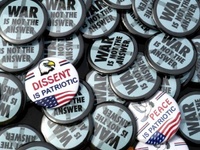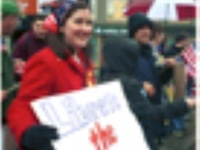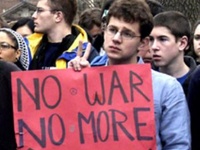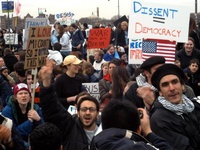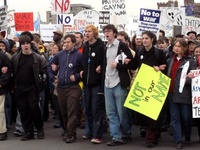“The movement was drastically underestimated at Harvard,” says Michael J. Getlin ’05. “It was strong.”
But those who organized the protests on campus say they felt many students were not receptive to the anti-war message.
“It is always hard to get people out to these things,” says Huibin “Aimee” Chew ’03, a member of the Harvard Initiative for Peace and Justice (HIPJ). “They just don’t believe that they are going to have any effect.”
Many critics of the strength of the anti-war movement say the peculiar circumstances around the war itself are to blame.
With no draft to poach their classmates, and few body bags crossing the ocean, anti-war protestors had little to rally behind, forcing them to mediate many competing views.
Thus, for both students and faculty protesters, success often depended on pursuing an elusive consensus.
President Bush’s claim of connections between former Iraqi President Saddam Hussein and the al Qaeda terrorist network complicated the anti-war position for many.
Other faculty viewed the frequent harkening to the Israeli-Palestinian conflict as an unjust conflation of two separate issues, and were thus reluctant to sign on to some anti-war efforts.
“The Israel-Palestine component blurred it for many people,” Harris says.
Teaching Assistant in History and Literature Timothy P. McCarthy ’93 says that he was reluctant to join FIPJ since many of its members had signed a petition urging that the University divest from Israel earlier that year.
Student also say that the unique circumstances of the war against Iraq divided their own ranks and hampered mobilization.
“At first we had a little trouble forming a position,” says Peter P. Buttigieg ’04 of the Harvard College Democrats. “There was a very credible liberal argument for going to war and it made us think twice of any stance we might take.”
Some say the conflicted liberal position was exacerbated by the patriotism caused by the Sept. 11, 2001 terrorist attacks.
“Harvard was really in shock after Sept. 11,” says Kenan Professor of Government Harvey C. Mansfield ’78.
While students and faculty members would eventually form anti-war coalitions, they would largely do so separately.
Read more in News
Pataki: 'Yale is Going to Crush Harvard'








